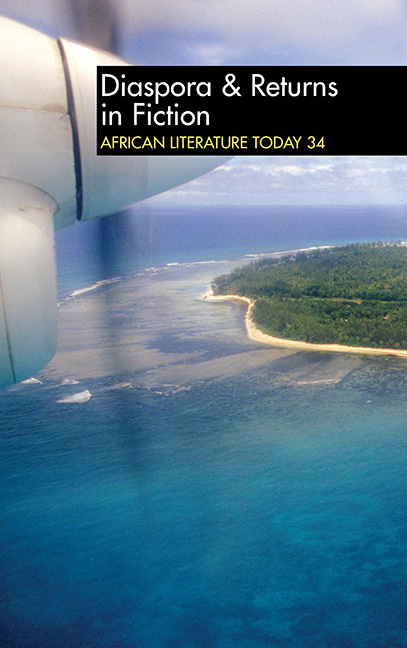Book contents
- Frontmatter
- Contents
- Notes on Contributors
- EDITORIAL ARTICLE
- Leaving Home/ Returning Home: Migration & Contemporary African Literature
- ARTICLES
- Alienation & Disorientation in Ayi Kwei Armah's Fragments
- Wait No Longer?: The Temporality of Return in Ayi Kwei Armah's Fragments
- ‘Our Relationship to Spirits’: History & Return in Syl Cheney-Coker's The Last Harmattan of Alusine Dunbar
- The ‘Rubble’ & the ‘Secret Sorrows’: Returning to Somalia in Nuruddin Farah's Links & Crossbones
- Migration, Cultural Memory & Identity in Benjamin Kwakye's The Other Crucifix
- No Place Like Home: Failures of Feeling & the Impossibility of Return in Dinaw Mengestu's The Beautiful Things That Heaven Bears
- ‘The Backward Glance’: Repetition & Return in Pede Hollist's So the Path Does Not Die
- Negotiating Race, Identity & Homecoming in Chimamanda Ngozi Adichie's Americanah & Pede Hollist's So the Path Does Not Die
- The Problem of Return in the Local Gambian Bildungsroman
- Returns ‘Home’: Constructing Belonging 185 in Black British Literature – Evans, Evaristo & Oyeyemi
- ‘Zimbabweanness Today’: An Interview with Tendai Huchu
- FEATURED ARTICLES
- LITERARY SUPPLEMENT
The Problem of Return in the Local Gambian Bildungsroman
from EDITORIAL ARTICLE
Published online by Cambridge University Press: 08 April 2017
- Frontmatter
- Contents
- Notes on Contributors
- EDITORIAL ARTICLE
- Leaving Home/ Returning Home: Migration & Contemporary African Literature
- ARTICLES
- Alienation & Disorientation in Ayi Kwei Armah's Fragments
- Wait No Longer?: The Temporality of Return in Ayi Kwei Armah's Fragments
- ‘Our Relationship to Spirits’: History & Return in Syl Cheney-Coker's The Last Harmattan of Alusine Dunbar
- The ‘Rubble’ & the ‘Secret Sorrows’: Returning to Somalia in Nuruddin Farah's Links & Crossbones
- Migration, Cultural Memory & Identity in Benjamin Kwakye's The Other Crucifix
- No Place Like Home: Failures of Feeling & the Impossibility of Return in Dinaw Mengestu's The Beautiful Things That Heaven Bears
- ‘The Backward Glance’: Repetition & Return in Pede Hollist's So the Path Does Not Die
- Negotiating Race, Identity & Homecoming in Chimamanda Ngozi Adichie's Americanah & Pede Hollist's So the Path Does Not Die
- The Problem of Return in the Local Gambian Bildungsroman
- Returns ‘Home’: Constructing Belonging 185 in Black British Literature – Evans, Evaristo & Oyeyemi
- ‘Zimbabweanness Today’: An Interview with Tendai Huchu
- FEATURED ARTICLES
- LITERARY SUPPLEMENT
Summary
Recent African fiction can help provide critical and compassionate perspectives on African migrants, complementing or correcting the impressions encouraged by images in the international media of sinking ships, and corpses washing ashore in the Mediterranean Sea. This is the argument of Dominic Thomas (‘The Global Mediterranean’: 153) with respect to Francophone African literature from the past twenty years; of Debra Faszer-McMahon and Victoria L. Ketz (African Immigrants in Contemporary Spanish Texts: xvii) with respect to Africans’ fictional accounts of journeys to Spain; and of Bimbola Oluwafunlola Idowu-Faith with respect to Chimamanda Ngozi Adichie's novel Americanah. In ‘Fictionalizing Theory, Theorizing Fiction’, explaining how the character Obinze leaves Nigeria because of ‘the oppressive lethargy of choicelessness’, Idowu-Faith proposes that Americanah reveals an oversight in the empirical scholarship on migration, which tends to consider little apart from the economic forces that motivate emigration (3). Idowu-Faith sees the voluntary return to Nigeria of Ifemelu and Obinze in the same light, namely, as choices that cannot be explained by quantitative or even rational factors, but merely by a vague preference for home, or hunger for excitement. Thus fiction constitutes data for sympathetic understanding of urgent socio-political realities.
Idowu-Faith overstates the novelty of the suggestion in Adichie's novel that flight from choicelessness might be a primary reason for migration from Africa and, equally, for return migration to Africa. Such themes are also examined, for instance, in Chris Abani's GraceLand and Zakes Mda's The Heart of Redness, not to mention Chinua Achebe's Anthills of the Savannah. She also understates the force of economic factors in Adichie's account of African migrants, for surely Ifemelu and Obinze are both content to resettle in Nigeria partly because they recognize they will be able to join its elite society? However, she is on stronger footing when she begins approaching the literary text not as a source of socio-political data but as a creative writer's advocacy for one particular response to that data, as, in her words, ‘a subtle call to intending migrants plagued by “choicelessness” and looking for something exciting somewhere else, to first look inwards within the homeland’ (17-18).
- Type
- Chapter
- Information
- ALT 34 Diaspora & Returns in FictionAfrican Literature Today, pp. 164 - 184Publisher: Boydell & BrewerPrint publication year: 2016

